In recent times, amidst weak global economic prospects and rising protectionist sentiments, an intense debate about globalization has resurfaced. Peter Egger, Sergey Nigai, and Nora Strecker have a new paper which adds to the debate by raising the possibility that globalization may have had the effect of increasing the reliance of governments on less mobile middle-class tax bases. They examined a taxation database of 65 countries in the 1980-2007 period, and find significant effects as globalization gathered pace post-1994.
Their narrative is simple. As economies open up and globalises, businesses and high-income individuals become footloose or to paraphrase Charles Tiebout, "vote with their feet". One way countries compete to retain and attract them is by lowering the corporate and marginal tax rates. In the process, among developed economies, on the average and when there is limited induced economic activity, tax revenues from these sources decline, forcing governments to rely more on the relatively immobile middle-class incomes. The authors write,
When goods and factors became relatively more footloose after 1994, evidence suggests that OECD governments found it more difficult to tax (arguably highly mobile) high-income earners. Moreover, in light of competition for such often high-skilled individuals, countries have further sought to decrease those individuals' personal income tax rates and compensated the foregone revenues by increasing taxes on individuals with middle incomes (and lower bargaining power than high-income earners)... under the threat of flight of high-skilled workers, governments reduced taxes for mobile high-income earners and increased them for the immobile middle- and upper-middle-income classes.
Consider this. Middle-class income tax rates have increased by around two percentage points across 65 countries, whereas corporate and marginal tax rates have declined significantly.
And, for the OECD countries, the burden has been carried by those at the middle, especially post-1994.
This effect is likely to get amplified as other technology-driven trends like e-commerce and remote working gains ground. The losers of globalization will perceive that their jobs are being taken by foreigners and their tax rates are rising. The widening inequality will exacerbate the discontent and generate more backlash against globalization.
There are no easy solutions. A two-pronged response may be the only way forward. One, the losers will have to be compensated by way of a stronger social safety net complemented with re-skilling programs that equip them with occupational mobility. The corollary of this though is to increase tax rates on the winners so as finance the benefits for the losers. But this redistribution runs into the Tiebout problem.
This brings us to the second response, which is about international coordination on taxation policies to prevent a race to the bottom. More so at a time when the global economy is weak, investments anemic, and international trade stagnant, and income growth confined to the highest earners, any competitive tax reduction is most likely to be a zero-sum game for all countries put together. No country gains without hurting others. In other words, tax reduction merely increases arbitrage opportunities without any commensurate increase in productive efficiency and output. In the absence of some form of global coordination or restraint, economies will be encouraged to indulge in competitive tax reduction that would only increase the relative tax burden on the middle-class everywhere.


Thanks. Interesting. Good complement to what Vox had today http://www.vox.com/2016/5/23/11704246/wealth-inequality-cartoon
ReplyDeleteMore and more income is coming from businesses and investments which countries want to attract by lowering taxes/safe havens.